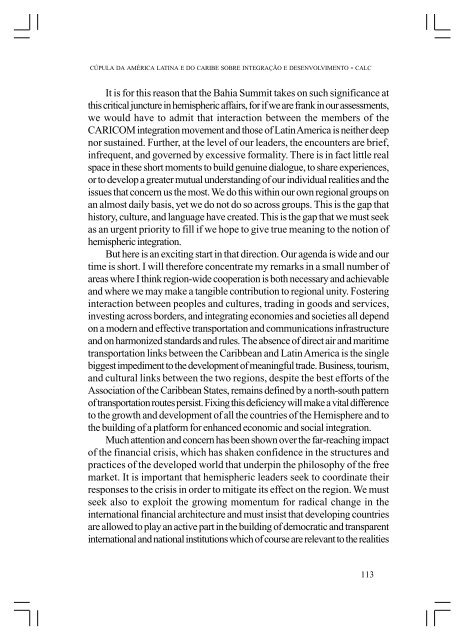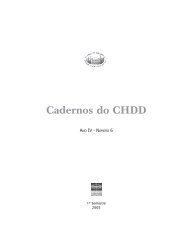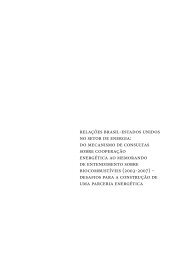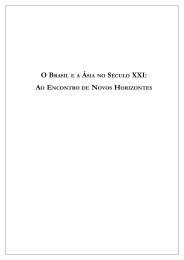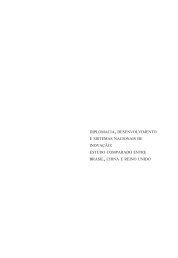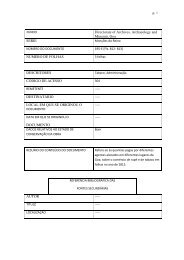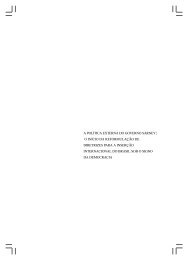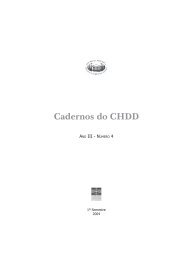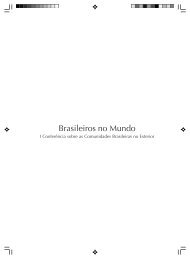- Page 1 and 2:
CÚPULA DA AMÉRICA LATINA E DO CAR
- Page 3 and 4:
Cúpula da América Latina e do Car
- Page 5 and 6:
Sumário Prefácio, 11 Ministro das
- Page 7 and 8:
Bahamas, 94 Primeiro-Ministro, Sr.
- Page 9 and 10:
Venezuela, 200 Presidente, Sr. Hugo
- Page 11 and 12:
Prefácio Celso Amorim Ministro das
- Page 13:
INTERVENÇÕES (VERSÃO ORIGINAL)
- Page 16 and 17:
INTERVENÇÕES (VERSÃO ORIGINAL) f
- Page 18 and 19:
INTERVENÇÕES (VERSÃO ORIGINAL) A
- Page 20 and 21:
INTERVENÇÕES (VERSÃO ORIGINAL) h
- Page 22 and 23:
INTERVENÇÕES (VERSÃO ORIGINAL) s
- Page 24 and 25:
INTERVENÇÕES (VERSÃO ORIGINAL) n
- Page 26 and 27:
INTERVENÇÕES (VERSÃO ORIGINAL) c
- Page 28 and 29:
INTERVENÇÕES (VERSÃO ORIGINAL) N
- Page 30 and 31:
INTERVENÇÕES (VERSÃO ORIGINAL) e
- Page 32 and 33:
INTERVENÇÕES (VERSÃO ORIGINAL) S
- Page 34 and 35:
INTERVENÇÕES (VERSÃO ORIGINAL) w
- Page 36 and 37:
INTERVENÇÕES (VERSÃO ORIGINAL) d
- Page 38 and 39:
INTERVENÇÕES (VERSÃO ORIGINAL) e
- Page 40 and 41:
INTERVENÇÕES (VERSÃO ORIGINAL) E
- Page 42 and 43:
INTERVENÇÕES (VERSÃO ORIGINAL) l
- Page 44 and 45:
INTERVENÇÕES (VERSÃO ORIGINAL) P
- Page 46 and 47:
INTERVENÇÕES (VERSÃO ORIGINAL) d
- Page 48 and 49:
INTERVENÇÕES (VERSÃO ORIGINAL) f
- Page 50 and 51:
INTERVENÇÕES (VERSÃO ORIGINAL) P
- Page 52 and 53:
INTERVENÇÕES (VERSÃO ORIGINAL) p
- Page 54 and 55:
INTERVENÇÕES (VERSÃO ORIGINAL) E
- Page 56 and 57:
INTERVENÇÕES (VERSÃO ORIGINAL) d
- Page 58 and 59:
INTERVENÇÕES (VERSÃO ORIGINAL) q
- Page 60 and 61:
INTERVENÇÕES (VERSÃO ORIGINAL) S
- Page 62 and 63: INTERVENÇÕES (VERSÃO ORIGINAL) A
- Page 64 and 65: INTERVENÇÕES (VERSÃO ORIGINAL) d
- Page 66 and 67: INTERVENÇÕES (VERSÃO ORIGINAL) w
- Page 68 and 69: INTERVENÇÕES (VERSÃO ORIGINAL) i
- Page 70 and 71: INTERVENÇÕES (VERSÃO ORIGINAL) O
- Page 72 and 73: INTERVENÇÕES (VERSÃO ORIGINAL) i
- Page 74 and 75: INTERVENÇÕES (VERSÃO ORIGINAL) l
- Page 76 and 77: INTERVENÇÕES (VERSÃO ORIGINAL) S
- Page 78 and 79: INTERVENÇÕES (VERSÃO ORIGINAL) m
- Page 80 and 81: INTERVENÇÕES (VERSÃO ORIGINAL) e
- Page 82 and 83: INTERVENÇÕES (VERSÃO ORIGINAL) a
- Page 84 and 85: INTERVENÇÕES (VERSÃO ORIGINAL) t
- Page 86 and 87: INTERVENÇÕES (VERSÃO ORIGINAL) i
- Page 88 and 89: INTERVENÇÕES (VERSÃO ORIGINAL) e
- Page 90 and 91: INTERVENÇÕES (VERSÃO ORIGINAL) d
- Page 92 and 93: INTERVENÇÕES (VERSÃO ORIGINAL) d
- Page 94 and 95: INTERVENÇÕES (VERSÃO ORIGINAL) P
- Page 96 and 97: INTERVENÇÕES (VERSÃO ORIGINAL) G
- Page 98 and 99: INTERVENÇÕES (VERSÃO ORIGINAL) P
- Page 100 and 101: INTERVENÇÕES (VERSÃO ORIGINAL) b
- Page 102 and 103: INTERVENÇÕES (VERSÃO ORIGINAL) f
- Page 104 and 105: INTERVENÇÕES (VERSÃO ORIGINAL) c
- Page 106 and 107: INTERVENÇÕES (VERSÃO ORIGINAL) a
- Page 108 and 109: INTERVENÇÕES (VERSÃO ORIGINAL) a
- Page 110 and 111: INTERVENÇÕES (VERSÃO ORIGINAL) e
- Page 114 and 115: INTERVENÇÕES (VERSÃO ORIGINAL) o
- Page 116 and 117: INTERVENÇÕES (VERSÃO ORIGINAL) c
- Page 118 and 119: INTERVENÇÕES (VERSÃO ORIGINAL) d
- Page 120 and 121: INTERVENÇÕES (VERSÃO ORIGINAL) e
- Page 122 and 123: INTERVENÇÕES (VERSÃO ORIGINAL) i
- Page 124 and 125: INTERVENÇÕES (VERSÃO ORIGINAL) j
- Page 126 and 127: INTERVENÇÕES (VERSÃO ORIGINAL) p
- Page 128 and 129: INTERVENÇÕES (VERSÃO ORIGINAL) Q
- Page 131: INTERVENÇÕES DO PRESIDENTE LUIZ I
- Page 134 and 135: INTERVENÇÕES DO PRESIDENTE LUIZ I
- Page 136 and 137: INTERVENÇÕES DO PRESIDENTE LUIZ I
- Page 138 and 139: INTERVENÇÕES DO PRESIDENTE LUIZ I
- Page 140 and 141: INTERVENÇÕES DO PRESIDENTE LUIZ I
- Page 142 and 143: INTERVENÇÕES DO PRESIDENTE LUIZ I
- Page 144 and 145: INTERVENÇÕES DO PRESIDENTE LUIZ I
- Page 146 and 147: INTERVENÇÕES DO PRESIDENTE LUIZ I
- Page 148 and 149: INTERVENÇÕES DO PRESIDENTE LUIZ I
- Page 150 and 151: INTERVENÇÕES DO PRESIDENTE LUIZ I
- Page 153: INTERVENÇÕES (VERSÕES EM PORTUGU
- Page 156 and 157: INTERVENÇÕES (VERSÕES EM PORTUGU
- Page 158 and 159: INTERVENÇÕES (VERSÕES EM PORTUGU
- Page 160 and 161: INTERVENÇÕES (VERSÕES EM PORTUGU
- Page 162 and 163:
INTERVENÇÕES (VERSÕES EM PORTUGU
- Page 164 and 165:
INTERVENÇÕES (VERSÕES EM PORTUGU
- Page 166 and 167:
INTERVENÇÕES (VERSÕES EM PORTUGU
- Page 168 and 169:
INTERVENÇÕES (VERSÕES EM PORTUGU
- Page 170 and 171:
INTERVENÇÕES (VERSÕES EM PORTUGU
- Page 172 and 173:
INTERVENÇÕES (VERSÕES EM PORTUGU
- Page 174 and 175:
INTERVENÇÕES (VERSÕES EM PORTUGU
- Page 176 and 177:
INTERVENÇÕES (VERSÕES EM PORTUGU
- Page 178 and 179:
INTERVENÇÕES (VERSÕES EM PORTUGU
- Page 180 and 181:
INTERVENÇÕES (VERSÕES EM PORTUGU
- Page 182 and 183:
INTERVENÇÕES (VERSÕES EM PORTUGU
- Page 184 and 185:
INTERVENÇÕES (VERSÕES EM PORTUGU
- Page 186 and 187:
INTERVENÇÕES (VERSÕES EM PORTUGU
- Page 188 and 189:
INTERVENÇÕES (VERSÕES EM PORTUGU
- Page 190 and 191:
INTERVENÇÕES (VERSÕES EM PORTUGU
- Page 192 and 193:
INTERVENÇÕES (VERSÕES EM PORTUGU
- Page 194 and 195:
INTERVENÇÕES (VERSÕES EM PORTUGU
- Page 196 and 197:
INTERVENÇÕES (VERSÕES EM PORTUGU
- Page 198 and 199:
INTERVENÇÕES (VERSÕES EM PORTUGU
- Page 200 and 201:
INTERVENÇÕES (VERSÕES EM PORTUGU
- Page 202 and 203:
INTERVENÇÕES (VERSÕES EM PORTUGU
- Page 204 and 205:
INTERVENÇÕES (VERSÕES EM PORTUGU
- Page 206 and 207:
INTERVENÇÕES (VERSÕES EM PORTUGU
- Page 208 and 209:
INTERVENÇÕES (VERSÕES EM PORTUGU
- Page 210 and 211:
INTERVENÇÕES (VERSÕES EM PORTUGU
- Page 212 and 213:
INTERVENÇÕES (VERSÕES EM PORTUGU
- Page 214 and 215:
INTERVENÇÕES (VERSÕES EM PORTUGU
- Page 216 and 217:
INTERVENÇÕES (VERSÕES EM PORTUGU
- Page 218 and 219:
INTERVENÇÕES (VERSÕES EM PORTUGU
- Page 220 and 221:
INTERVENÇÕES (VERSÕES EM PORTUGU
- Page 222 and 223:
INTERVENÇÕES (VERSÕES EM PORTUGU
- Page 224 and 225:
INTERVENÇÕES (VERSÕES EM PORTUGU
- Page 226 and 227:
INTERVENÇÕES (VERSÕES EM PORTUGU
- Page 228 and 229:
INTERVENÇÕES (VERSÕES EM PORTUGU
- Page 230 and 231:
INTERVENÇÕES (VERSÕES EM PORTUGU
- Page 232 and 233:
INTERVENÇÕES (VERSÕES EM PORTUGU
- Page 234 and 235:
INTERVENÇÕES (VERSÕES EM PORTUGU
- Page 236 and 237:
INTERVENÇÕES (VERSÕES EM PORTUGU
- Page 238 and 239:
INTERVENÇÕES (VERSÕES EM PORTUGU
- Page 240 and 241:
INTERVENÇÕES (VERSÕES EM PORTUGU
- Page 242 and 243:
INTERVENÇÕES (VERSÕES EM PORTUGU
- Page 244 and 245:
INTERVENÇÕES (VERSÕES EM PORTUGU
- Page 246 and 247:
INTERVENÇÕES (VERSÕES EM PORTUGU
- Page 248 and 249:
INTERVENÇÕES (VERSÕES EM PORTUGU
- Page 250 and 251:
INTERVENÇÕES (VERSÕES EM PORTUGU
- Page 252 and 253:
INTERVENÇÕES (VERSÕES EM PORTUGU
- Page 254 and 255:
INTERVENÇÕES (VERSÕES EM PORTUGU
- Page 256 and 257:
INTERVENÇÕES (VERSÕES EM PORTUGU
- Page 258 and 259:
INTERVENÇÕES (VERSÕES EM PORTUGU
- Page 260 and 261:
INTERVENÇÕES (VERSÕES EM PORTUGU
- Page 262 and 263:
INTERVENÇÕES (VERSÕES EM PORTUGU
- Page 264 and 265:
INTERVENÇÕES (VERSÕES EM PORTUGU
- Page 266 and 267:
INTERVENÇÕES (VERSÕES EM PORTUGU
- Page 268 and 269:
INTERVENÇÕES (VERSÕES EM PORTUGU
- Page 271:
DECLARAÇÃO DE SALVADOR E DECLARA
- Page 274 and 275:
DECLARAÇÃO DE SALVADOR E DECLARA
- Page 276 and 277:
DECLARAÇÃO DE SALVADOR E DECLARA
- Page 278 and 279:
DECLARAÇÃO DE SALVADOR E DECLARA
- Page 280 and 281:
DECLARAÇÃO DE SALVADOR E DECLARA
- Page 282 and 283:
DECLARAÇÃO DE SALVADOR E DECLARA
- Page 284 and 285:
DECLARAÇÃO DE SALVADOR E DECLARA
- Page 286 and 287:
DECLARAÇÃO DE SALVADOR E DECLARA
- Page 288 and 289:
DECLARAÇÃO DE SALVADOR E DECLARA
- Page 290 and 291:
DECLARAÇÃO DE SALVADOR E DECLARA
- Page 292 and 293:
DECLARAÇÃO DE SALVADOR E DECLARA
- Page 294 and 295:
DECLARAÇÃO DE SALVADOR E DECLARA
- Page 296 and 297:
DECLARAÇÃO DE SALVADOR E DECLARA
- Page 298 and 299:
DECLARAÇÃO DE SALVADOR E DECLARA
- Page 300 and 301:
DECLARAÇÃO DE SALVADOR E DECLARA
- Page 302 and 303:
DECLARAÇÃO DE SALVADOR E DECLARA
- Page 304 and 305:
DECLARAÇÃO DE SALVADOR E DECLARA
- Page 306 and 307:
DECLARAÇÃO DE SALVADOR E DECLARA
- Page 308 and 309:
DECLARAÇÃO DE SALVADOR E DECLARA
- Page 310 and 311:
DECLARAÇÃO DE SALVADOR E DECLARA
- Page 312 and 313:
DECLARAÇÃO DE SALVADOR E DECLARA
- Page 314 and 315:
DECLARAÇÃO DE SALVADOR E DECLARA
- Page 316 and 317:
DECLARAÇÃO DE SALVADOR E DECLARA
- Page 318 and 319:
DECLARAÇÃO DE SALVADOR E DECLARA
- Page 320 and 321:
DECLARAÇÃO DE SALVADOR E DECLARA
- Page 322 and 323:
DECLARAÇÃO DE SALVADOR E DECLARA
- Page 325 and 326:
Chefes de Delegação Antígua e Ba
- Page 327 and 328:
CÚPULA DA AMÉRICA LATINA E DO CAR
- Page 329:
CÚPULA DA AMÉRICA LATINA E DO CAR


